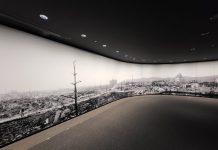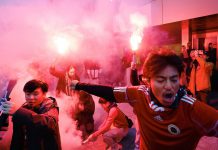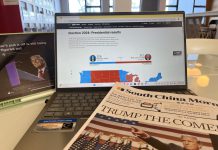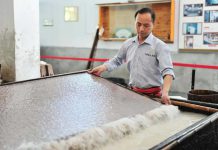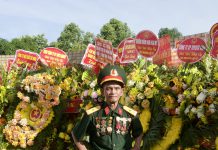Gloria Chan Kwong-wai, 39, a veteran social campaigner, thinks celebrities can help transmit political messages effectively to politically apathetic groups such as homemakers and middle-aged people as they are appealing and charismatic. “People know something is happening because they know the celebrities participating in it,” she says.
Chan says on most occasions, organisers of social campaigns invite celebrities to be ambassadors or represent their cause after evaluating if their images are in line with the messages to be conveyed and the nature of the campaigns.
Apart from joining the protest in person, celebrities can also advocate causes they believe in through their works. Hold Up Your Umbrella, the song Denise Ho and Anthony Wong Yiu-ming sang on the Admiralty stage on October 4, was written by Pan and the renowned lyricist Albert Leung Wai-man, better known as Lin Xi. The song was played repeatedly in the occupied areas and became one of the anthems of the movement.
Anthony Fung Ying-him, director of the School of Journalism and Communication at the Chinese University of Hong Kong, says traditionally, the songs that are popular in Hong Kong tend to be love songs that depict romantic struggles. However, political and protest songs have become more prevalent in recent years.
Fung thinks anthems like Hold up the Umbrella can have a huge psychological influence on protesters when they are played at protest events as they etch unique rhythms and sentimental lyrics into the minds of protesters. When the crowds sing these songs together, they are creating a collective memory. “People remember the movement not because they stand or sit there for a long time, but the collective actions like singing,” he says.
Hong Kong celebrities have stood together to sing purposely written songs in support of democracy before the Umbrella Movement. The 1989 Concert for Democracy in China, held in front of a packed audience at the Happy Valley racecourse has already entered Hong Kong’s collective memory. Back then, the entertainment industry, like Hong Kong itself, was united in its support for the student protesters in Beijing. Among the star-studded line-up for the concert were Cantopop legends like Anita Mui and Andy Lau, and actors who have since become staunchly establishment figures like Jackie Chan and Liza Wang.
Compared to 1989, the costs of taking a high-profile stance in favour of democracy are now much higher. While Hong Kong’s golden age of film and pop music has passed, the entertainment market in the Mainland continues to grow. In 2000, China’s total box office receipts were Rmb4.8 billion, in 2014 the figure was Rmb29.6 billion.
Stephen Au Kam-tong, a 50-year-old actor and director, is a contracted artist with Television Broadcasts Limited (TVB) and one of the celebrities who is consistently outspoken on social and political affairs.
Au says that although there are no rules restricting the freedom of speech in artists’ contracts, TVB has sent mass mails and memos to “strongly advise” artists not to talk publicly about their political stances too much and not to accept interview requests from the Next Media Group.
Au is not afraid of pressure from TVB and he dismisses suggestions that celebrities should stay out of politics. To Au, artists are obliged to understand society as they are Hong Kong citizens. “An artist should have a mission to care about society and to criticise politics,” he says. “I realised that on the first day I entered the industry.”
What worries him more is how the media and the public interpret his words. As celebrities attract media attention, they have to be more cautious when commenting on social issues. Sammy Leung Chi-kin, a well-known DJ at Commercial Radio learnt this the hard way.







